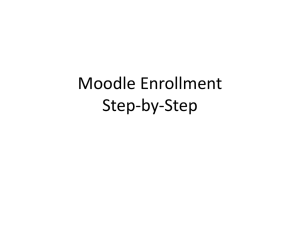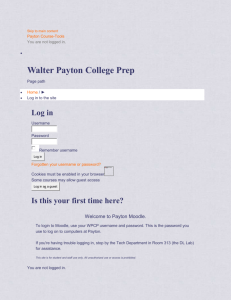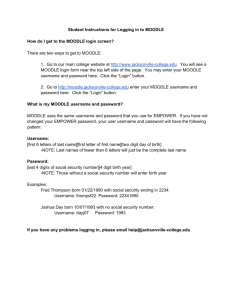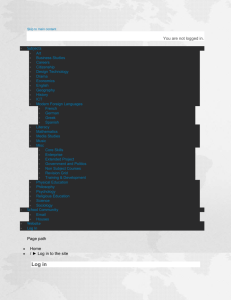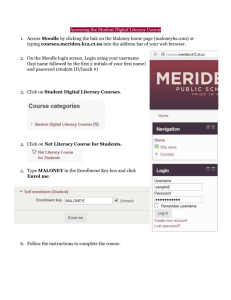FIN6186.E1 Managerial Finance
advertisement
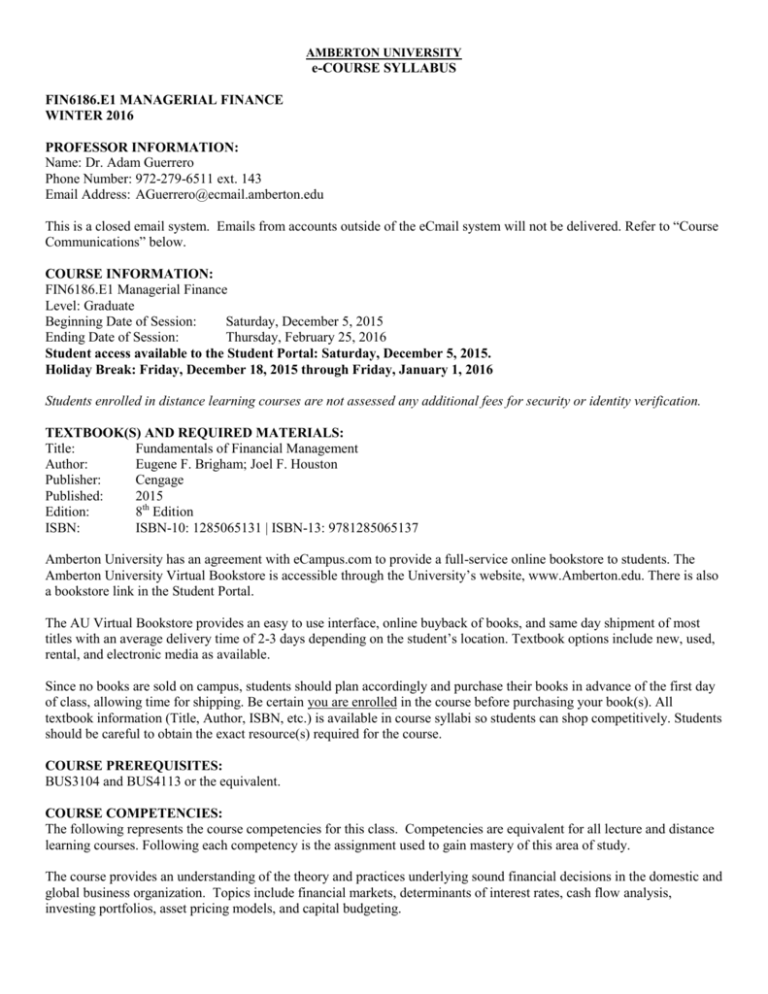
AMBERTON UNIVERSITY e-COURSE SYLLABUS FIN6186.E1 MANAGERIAL FINANCE WINTER 2016 PROFESSOR INFORMATION: Name: Dr. Adam Guerrero Phone Number: 972-279-6511 ext. 143 Email Address: AGuerrero@ecmail.amberton.edu This is a closed email system. Emails from accounts outside of the eCmail system will not be delivered. Refer to “Course Communications” below. COURSE INFORMATION: FIN6186.E1 Managerial Finance Level: Graduate Beginning Date of Session: Saturday, December 5, 2015 Ending Date of Session: Thursday, February 25, 2016 Student access available to the Student Portal: Saturday, December 5, 2015. Holiday Break: Friday, December 18, 2015 through Friday, January 1, 2016 Students enrolled in distance learning courses are not assessed any additional fees for security or identity verification. TEXTBOOK(S) AND REQUIRED MATERIALS: Title: Fundamentals of Financial Management Author: Eugene F. Brigham; Joel F. Houston Publisher: Cengage Published: 2015 Edition: 8th Edition ISBN: ISBN-10: 1285065131 | ISBN-13: 9781285065137 Amberton University has an agreement with eCampus.com to provide a full-service online bookstore to students. The Amberton University Virtual Bookstore is accessible through the University’s website, www.Amberton.edu. There is also a bookstore link in the Student Portal. The AU Virtual Bookstore provides an easy to use interface, online buyback of books, and same day shipment of most titles with an average delivery time of 2-3 days depending on the student’s location. Textbook options include new, used, rental, and electronic media as available. Since no books are sold on campus, students should plan accordingly and purchase their books in advance of the first day of class, allowing time for shipping. Be certain you are enrolled in the course before purchasing your book(s). All textbook information (Title, Author, ISBN, etc.) is available in course syllabi so students can shop competitively. Students should be careful to obtain the exact resource(s) required for the course. COURSE PREREQUISITES: BUS3104 and BUS4113 or the equivalent. COURSE COMPETENCIES: The following represents the course competencies for this class. Competencies are equivalent for all lecture and distance learning courses. Following each competency is the assignment used to gain mastery of this area of study. The course provides an understanding of the theory and practices underlying sound financial decisions in the domestic and global business organization. Topics include financial markets, determinants of interest rates, cash flow analysis, investing portfolios, asset pricing models, and capital budgeting. UPON COMPLETION OF THE COURSE, THE STUDENT WILL BE COMPETENT IN: 1. Discussing the place finance has in an organization. 2. Understanding the different forms of business organizations. 3. Understanding how financial decisions help accomplish organizational goals. 4. Discussing financial markets. 5. Explaining the determinants of interest rates. 6. Explaining cash flow analysis. 7. Understanding methods of stock and bond valuations. 8. Describing the relationship between risk and return and portfolio risk. 9. Describing modern portfolio theory and the Capital Asset Pricing Model. 10. Analyzing net present value concepts and discounted cash flow analysis. 11. Explaining and applying the basics of capital budgeting. 12. Estimating cash flow for capital budgeting. 13. Explaining risk analysis in capital budgeting and capital structure theories. 14. Determining business and financial risks. 15. Explaining dividend policy. 16. Explaining the investment banking process. 17. Explaining stock and bond issues as a source of long-term financing. 18. Analyzing key concepts in International Corporate Finance. COURSE POLICIES: Weekly Assignments: Each week begins on a Saturday and ends on Friday. All assessments must be submitted before midnight Friday night (with the exception of discussions, for which students must consistently engage throughout the week). Assignments will be comprised of chapter questions, threaded discussions, a midterm reflection paper, a wiki, and a Harvard case study. Students will also complete three competency-based examinations. Assignment details will be provided in Moodle. Threaded Discussions: Discussion forums will run Saturday through Friday on designated weeks. Students are expected to be engaged online a minimum of three days per week and to contribute in a meaningful way. Student responses to the instructor’s initial discussion question(s) should be posted by midnight Monday night. Responses should be at minimum 200 words. Overall performance will be assessed in consideration of professionalism, consistency, and quality of engagement. Late Assignments: Since students have been provided with advanced notice of due dates for all assignments, late work will normally not be accepted. If for some reason a student has a valid excuse with documentation, late work may be accepted for partial credit. Student’s Responsibilities This syllabus contains information, policies and procedures for a specific course. By enrolling, the student agrees to read, understand and abide by the policies, rules, regulations, and ethical standards of Amberton University as contained in the current university catalog and schedule of classes. COURSE OUTLINE AND CALENDAR: Week 1 12-5 to 1211 Readings Chapter 1 – Introduction to Financial Management Chapter 2- Financial Markets and Institutions Course Competencies 1, 2, 3, 4 Homework Presentation/Problems Review PPT presentations for chapters 1 and 2 and complete this week’s problem set Discussion Introduce yourself to your peers Due Date Submit Question Set 1 by midnight Friday night Work with peers throughout the week to collaborate and construct knowledge in our Week 1 TVM Wiki Wiki 2 12-12 to 1218 Chapter 3 – Financial Statements, Cash Flow, and Taxes 3, 4, 6, 14 Chapter 4 – Analysis of Financial Statements 3 1-2 to 1-8 Chapter 5 – Time Value of Money Take part in our Week 1 TVM Wiki Presentation/Problems Review PPT presentations for chapters 3 and 4 and complete this week’s problem set Discussion Take part in Discussion 1 3, 4, 5 Presentation/Problems Review TVM PPT presentation and complete this week’s problem set Exam 1 (Chapters 1-5) 4 1-9 to 1-15 Chapter 6 – Interest Rates 3, 4, 5, 7 Chapter7 – Bonds and Their Valuation 5 1-16 to 122 Chapter 8 – Risk and Rates of Return 3, 4, 7, 8 Chapter 9 – Stocks and Their Valuation Presentation/Problems Review PPT presentations for chapters 6 and 7 and complete this week’s problem set Discussion Take part in Discussion 2 Presentation/Problems Review PPT presentations for chapters 8 and 9 Gemini Electronics Case Study Read Gemini Electronics Case Study Submit Question Set 2 by midnight Friday night Consistently engage peers in Discussion 1 throughout the week Submit Question Set 3 by midnight Friday night Exam 1 must be completed by midnight Friday night on 1-8 Submit Question Set 4 by midnight Friday night Consistently engage peers in Discussion 2 throughout the week Submit Midterm Reflection Paper by midnight Friday night Construct Gemini Electronics Case Study Groups (4 students max per group) Midterm Journaling Activity Complete Midterm Reflection Paper 6 1-23 to 129 Chapter 10 – The Cost of Capital 7 1-30 to 2-5 Chapter 12 – Cash Flow Estimation and Risk 3, 6, 9, 10, 11, 13 Chapter 11 – The Basics of Capital Budgeting 3, 4, 6, 8, 9, 10 Chapter 13 – Capital Structure and Leverage 8 2-6 to 2-12 Chapter 14 – Distributions to Shareholders: Dividends and Share Repurchases Presentation/Problems Review PPT presentations for chapters 10 and 11 and complete this week’s problem set Exam 2 (Chapters 6-11) Presentation/Problems Review PPT presentations for chapters 12 and 13 and complete this week’s problem set Submit Question Set 5 by midnight Friday night Exam 2 must be completed by midnight Friday night on 1-29 Submit Question Set 6 by midnight Friday night Consistently engage peers in Discussion 3 throughout the week Discussion Take part in Discussion 3 3, 4, 13, 15, 17 Presentation/Problems Review PPT presentations for chapters 14 and 15 and complete this week’s problem set Submit Question Set 7 by midnight Friday night Consistently engage peers in Discussion 4 throughout the week Chapter 15 – Working Capital Management 9 2-13 to 219 Chapter 16 – Financial Planning and Forecasting Chapter 17 – An Introduction to International Financial Management 10 2-20 to 225 Review for Final Exam Discussion Take part in Discussion 4 3, 6, 8, 10, 12, 13, 18 Presentation/Problems Review PPT presentations for chapters 16 and 17 and complete this week’s problem set Gemini Electronics Case Study Complete Gemini Electronics Case Study Exam 3 (Chapters 12-16) Submit Question Set 8 by midnight Friday night Submit Gemini Electronics Case Study by midnight Friday night 2-19 Exam 3 must be completed by 5pm Central Standard Time (CST) on Thursday 2-25 GRADING CRITERIA: Activity Deliverable Points Problem Sets Weekly Question Set or Online Quiz 8 at 3% Each for 24% Discussion Boards Online Discussion 4 at 5% Each for 20% Gemini Case Study Analysis Written Case (6p to 10p Max) 1 at 22% Midterm Journaling Activity Midterm Reflection Paper (1p) 1 at 5% Wiki Exercise Concept-Based Wikis 1 at 5% Exams Competency-Based Exams 3 at 8% Each for 24% Total = 100% Graduate 92 – 100 82 – 91 72 – 81 62 – 71 Below 62 A B C D F GRADE NOTIFICATION AND INSTRUCTOR FEEDBACK: A successful distance learning experience requires a flow of communication between instructor and student throughout the session. Instructor comments are considered essential to the learning process. Therefore, each assignment/exam submitted will be reviewed, graded and returned to the student in a timely manner along with the appropriate commentary. Students should carefully review all comments. Final grades are mailed approximately one week after the last day of the session to the student’s address of record. Amberton University staff will not post or release grades over the phone. University instructors will not leave a message with comments or grades in any type of media that is not secure. For questions regarding grades after the semester has ended, students should use their eCmail account and contact the instructor at the faculty eCmail address as provided above in Professor Information area. Incomplete Grades An “I” (incomplete grade) is given at the discretion of the professor and may be given only when an emergency or illness prevents the student from completing course requirements. Should an “I” be granted, the student has 30 days from the end of the session to complete the conditions of the incomplete. An “I” which is not properly removed within 30 days following the session enrolled will become an “F” grade. How To Withdraw From a Course To be official, the class withdrawal must be in writing and signed by the student requesting the withdrawal; no withdrawal is accepted verbally. Please review the “Schedule of Classes” (online or in-print) for procedures for class changes or withdrawals and the refund policy and schedule. COURSE DELIVERY METHODOLOGY: This course is offered as a distance-learning course through the Moodle Learning Platform. Amberton’s distance learning courses, called e-Courses, are identical to classroom courses in terms of learning outcomes, competencies, and instructor expectations. A student choosing to take an e-Course must have the following skills and technical capabilities: 1. Access to the Internet 2. General knowledge in: Internet browser settings and configuration e-mail and file attachments Uploading and downloading files Using a word processing package 3. Ability to conduct on-line research Students who have not mastered these skills should not enroll for this course, but should consider enrolling in MIS2110 Computer Concepts and Internet Technologies for instruction in these areas. HOW TO ACCESS YOUR COURSE: Through the Amberton University Student Portal Students enrolled in distance learning courses using the Moodle Learning Platform may access the course through the Amberton University Student Portal. The site may be accessed through the University’s main page (http://www.Amberton.edu). After selecting the “Student Portal” link, you will be prompted for a Username and Password. Use your assigned username and password (AUID) as described below to enter the AU Student Portal: Username = your capitalized firstname initial+lastname+last 3 digits of your SSN. * Use your name exactly as it is listed on the University’s records, including any suffixes or hyphenations, such as Jr, Sr, or II, as a part of your username. For example: James Jones, Jr. Username: JJonesJr789 SSN: 123-45-6789 Password = your Amberton University ID# (AUID) including the dashes For example: 04-999-999 Once your login has been validated, you may select from a variety of menu options, including your individual ECourse, eCmail access, Discussion Forum, Chat Room, Remote Research, General Tools, all Syllabi, QEP Tutorials and Electronic Instructor Folders (FTP). If you are accessing the Student Portal from a public or shared computer, close the browser completely when finished, or click on the Logout button. For security purposes, no other person should have access to your Username or Password. If you feel your information has been compromised or if you experience technical difficulties, contact the e-course system administrator at: e-sysop@amberton.edu If you have lost or do not know your Amberton ID#, please contact the Student Services Office 972/279-6511 or advisor@Amberton.edu for a replacement AUID card. You must know your Amberton ID# to gain access to the course and to send email to your professor. Through the Amberton University Moodle Website Students enrolled in distance learning courses using the Moodle Learning Platform may also access the course by going to: http://moodle.Amberton.edu The username and password for the Moodle Learning Platform will be emailed to the student’s eCmail account prior to the start of the course. For those utilizing Moodle for the first time, the username and password for the Moodle Learning Platform will be emailed to the student’s eCmail account prior to the start of the course. For those returning to Moodle who do not remember their username and password, click on the link “Forgotten your username or password” available on the Moodle log in page (http://moodle.Amberton.edu). Otherwise use the same username and password as previous session. Moodle Tutorial: Upon successful log in and access to the Moodle learning platform, there is a Student Moodle Tutorials course available, to learn about the basics of Moodle. Simply click on the link for the Student Moodle Tutorials and read through the various learning topics: Navigating; Communicating; Assignments & Exams; Grades; and Student Resources. COURSE COMMUNICATIONS: Students will communicate with faculty through the Moodle Learning Platform or the Amberton University eCmail system. Each student enrolled in this course is assigned an account to each method and are encouraged to check both regularly for University and course news and notices. Each student enrolled is assigned an Amberton email account, which gives the student access to the Amberton student eCmail system (eCmail.Amberton.edu). Students are encouraged to check their email regularly for University news and notices. The student’s assigned eCmail address would be Username@eCmail.Amberton.edu Example: LJones-Smith789@ecmail.Amberton.edu The student Username is determined by: firstname initial+lastname+last 3 digits of student ssn. For example: Linda Jones SSN: 123-45-6789 Email Address = LJones789@ecmail.Amberton.edu Students will be prompted for a Username and Password when accessing their eCmail account. Use the Username portion of the email address as the username (Example: LJones789) and your Amberton ID# (including the dashes) as the password. You must use Amberton’s eCmail system to send emails, do not use outside email accounts (i.e.: Yahoo, MSN, Hotmail), as email from outside the University will be rejected. Students are responsible for reviewing the “Communication Guidelines” provided on the individual E-Course for specific instructor requirements. Upon completion of a session, all communication is removed from the Moodle and eCmail accounts. If a student needs to maintain a record of communications or assignments, the student is strongly encouraged to print out or download these items to a disk for their own records. FORMAT AND SUBMISSION OF ASSIGNMENTS: Assignments are to be submitted to the appropriate assignment Drop Box in the Moodle system. Specific directions and guidelines for submission of assignments are located on-line in the “Communication Guidelines” of the e-course. Due to compatibility issues, Office 2007 files cannot be read by earlier versions of Microsoft Office. Before submitting an exercise file, confirm the file is in the proper format for grading by the instructor. COURSE EVALUATION: Each session, all Amberton students are requested to evaluate their courses. The evaluation process is an important one and provides students with an anonymous and confidential way to give meaningful feedback to the University. Summary information and comments are provided to faculty after the close of the session. Students’ identities are not disclosed. Students will be notified through the Amberton eCmail system of the Course Evaluation procedures. Usually, the evaluations take place during the last two weeks of the session. Please take advantage of this opportunity and participate in the evaluation process. ACADEMIC HONESTY/PLAGIARISM: Plagiarism is the presentation of someone else’s information as though it were your own. If you use another person’s words, ideas or information, or if you use material from a source – whether a book, magazine, newspaper, business publication, broadcast, speech, or electronic media – you must acknowledge the source. Failure to do so violates Amberton University’s ethics policy. RESEARCH RESOURCES: The student is encouraged to use the Amberton Electronic Library as a research resource for this course. The Electronic Library provides access to full-text and abstract articles as well as links to a variety of remote research tools. Students can search Amberton Library Resource Center holdings through the on-line public access circulation system. The physical library contains a specialized collection of research materials specifically chosen to support the degrees and courses offered at Amberton. Interlibrary loan and document delivery services are available. The TexShare Card offers borrowing privileges in libraries all across the state of Texas. Students with research questions or questions about Library services are encouraged to visit the “Ask-A-Librarian” section of the discussion forum or email their questions to library@Amberton.edu. QUALITY ENHANCEMENT PLAN – QEP TOOLKITS: Online research resources are available through “Research Tools Database”, accessible through the Student Portal. (For additional assistance, students may access the “QEP Tutorials” link located in the General Tools area on the Student Portal.) Access the Portal by clicking “Student Portal” from the University’s website. You must know your Amberton ID to access the Portal.

